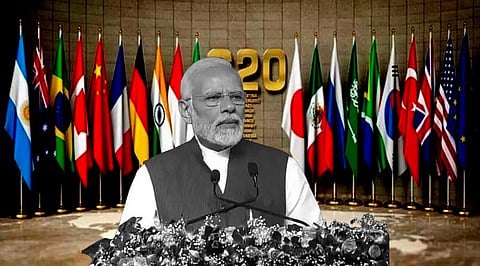
- Insights
- Cryptocurrencies
- Stocks
- White Papers
- Industry
- Geography
- Insights
- Cryptocurrencies
- Stocks
- White Papers
- Industry
- Geography


India now has the chance to lead global cooperation to create a secure cyberspace and to give cybersecurity concerns a top priority.
India took over the G20 chairmanship on December 1, 2022, the organisation that unites the 20 biggest economies in the globe. The G20's priorities have changed over the past two years as a result of the slow post-pandemic economic recovery and rising geopolitical tensions brought on by the conflict in Russia and Ukraine. For India, the agenda will be dominated by issues like digital public infrastructure, supply chain resilience, sustainability and climate change, and reformed multilateralism. As the globe enters the second decade of the twenty-first century, India can lead initiatives in important sectors thanks to its administration.
Cybersecurity is one such crucial subject that has remained extremely unpredictable and requires ongoing G20 attention. There is an urgent need for a safe cyberspace given the exponential rise in the quantity and variety of cyber threats, particularly to vital infrastructure: The most recent instance is the ongoing interruption brought on by a ransomware attack at the AIIMS in New Delhi. The information technology industry, transportation systems, financial services, and communications infrastructure are some of the targets of more sophisticated cyberattacks launched by nation-state actors, as per the 2022 Microsoft Digital Defense Report. However, the potential cascade effect of such threats disrupts digital public platforms, which are infrastructure that allows the delivery of government services, in addition to these crucial infrastructure sectors.
The respective national CERTS have historically been crucial in recognizing potential cyber threats that could originate domestically or internationally. They lead the way in disclosing cybersecurity events and breaches. CERTs from many nations currently have bilateral agreements in place to share sensitive information and details of cybersecurity events. These serve as the forerunner in assuring prompt responses to any serious approaching attack targeting crucial infrastructure. While bilateral coordination between various CERT teams has historically been the norm, there hasn't always been full transparency regarding the data shared between the two nations. In order to respond to cyber threats and counteract cyberwarfare strategies, a global effort is required.
In his remarks at Interpol's 90th General Assembly in October 2022, Indian Prime Minister Narendra Modi emphasized the importance of a global effort to combat illegal activity. India now has the chance to lead a global alliance to create a secure cyberspace for business transactions and grow the digital economy. As part of this, New Delhi must assess the dangers posed by ransomware and distributed denial-of-service assaults on vital infrastructure and online public spaces and hold a cybersecurity discussion aimed at stopping these threats. Building cyber forensic capabilities to look into darknet activity and crypto transactions, which facilitate cybercrimes, is another area of possible concentration.
The substantial skill gap between average users and professionals in regard to cyber risks is a contemporary issue. Additionally, there is a need for better cybersecurity measures to protect sensitive data because a variety of parties, including financial institutions, governmental organisations, and law enforcement agencies, store their data on the cloud. This calls for sufficient cybersecurity specialists as well as people who can help develop this field's capability or knowledge. India can present a roadmap to impart or educate cybersecurity capabilities to various social groups as part of its G20 leadership. The G20 can foresee many tactics to implement cybersecurity skilling initiatives across the member states and their cultures, even though it is challenging to create a single curriculum for people of all ages and backgrounds. The G20 governments' joint duty would be to provide their citizens with the know-how to identify, report, and stop potential cyberthreats and data breaches.
